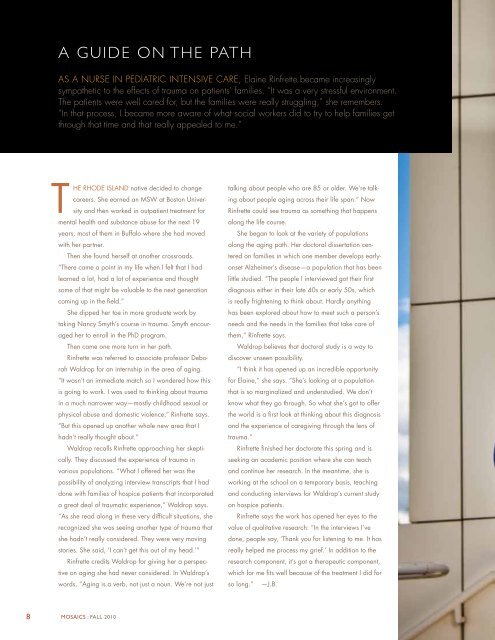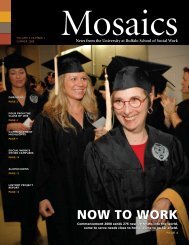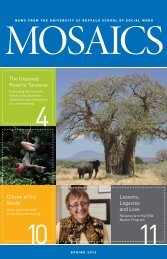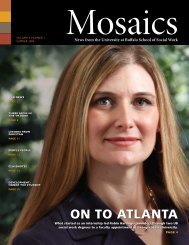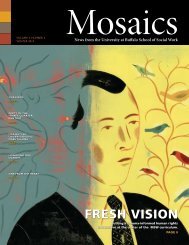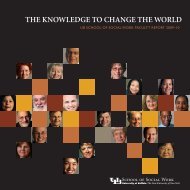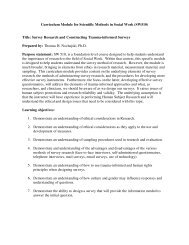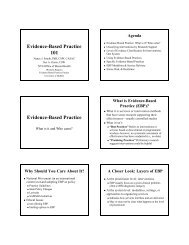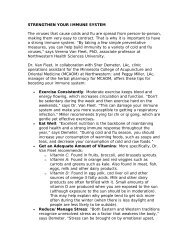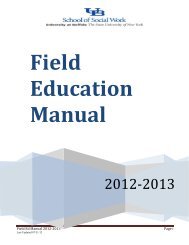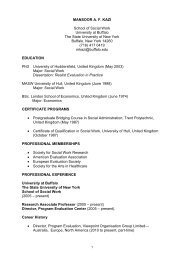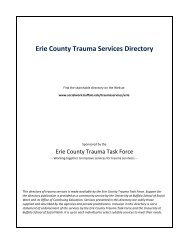come with me - UB School of Social Work - University at Buffalo
come with me - UB School of Social Work - University at Buffalo
come with me - UB School of Social Work - University at Buffalo
Create successful ePaper yourself
Turn your PDF publications into a flip-book with our unique Google optimized e-Paper software.
A GUIDE ON THE PATH<br />
As a nurse in pedi<strong>at</strong>ric intensive care, Elaine Rinfrette beca<strong>me</strong> increasingly<br />
symp<strong>at</strong>hetic to the effects <strong>of</strong> trauma on p<strong>at</strong>ients’ families. “It was a very stressful environ<strong>me</strong>nt.<br />
The p<strong>at</strong>ients were well cared for, but the families were really struggling,” she re<strong>me</strong>mbers.<br />
“In th<strong>at</strong> process, I beca<strong>me</strong> more aware <strong>of</strong> wh<strong>at</strong> social workers did to try to help families get<br />
through th<strong>at</strong> ti<strong>me</strong> and th<strong>at</strong> really appealed to <strong>me</strong>.”<br />
The Rhode Island n<strong>at</strong>ive decided to change<br />
careers. She earned an MSW <strong>at</strong> Boston <strong>University</strong><br />
and then worked in outp<strong>at</strong>ient tre<strong>at</strong><strong>me</strong>nt for<br />
<strong>me</strong>ntal health and substance abuse for the next 19<br />
years, most <strong>of</strong> them in <strong>Buffalo</strong> where she had moved<br />
<strong>with</strong> her partner.<br />
Then she found herself <strong>at</strong> another crossroads.<br />
“There ca<strong>me</strong> a point in my life when I felt th<strong>at</strong> I had<br />
learned a lot, had a lot <strong>of</strong> experience and thought<br />
so<strong>me</strong> <strong>of</strong> th<strong>at</strong> might be valuable to the next gener<strong>at</strong>ion<br />
coming up in the field.”<br />
She dipped her toe in more gradu<strong>at</strong>e work by<br />
taking Nancy Smyth’s course in trauma. Smyth encouraged<br />
her to enroll in the PhD program.<br />
Then ca<strong>me</strong> one more turn in her p<strong>at</strong>h.<br />
Rinfrette was referred to associ<strong>at</strong>e pr<strong>of</strong>essor Deborah<br />
Waldrop for an internship in the area <strong>of</strong> aging.<br />
“It wasn’t an im<strong>me</strong>di<strong>at</strong>e m<strong>at</strong>ch so I wondered how this<br />
is going to work. I was used to thinking about trauma<br />
in a much narrower way—mostly childhood sexual or<br />
physical abuse and do<strong>me</strong>stic violence,” Rinfrette says.<br />
“But this opened up another whole new area th<strong>at</strong> I<br />
hadn’t really thought about.”<br />
Waldrop recalls Rinfrette approaching her skeptically.<br />
They discussed the experience <strong>of</strong> trauma in<br />
various popul<strong>at</strong>ions. “Wh<strong>at</strong> I <strong>of</strong>fered her was the<br />
possibility <strong>of</strong> analyzing interview transcripts th<strong>at</strong> I had<br />
done <strong>with</strong> families <strong>of</strong> hospice p<strong>at</strong>ients th<strong>at</strong> incorpor<strong>at</strong>ed<br />
a gre<strong>at</strong> deal <strong>of</strong> traum<strong>at</strong>ic experience,” Waldrop says.<br />
“As she read along in these very difficult situ<strong>at</strong>ions, she<br />
recognized she was seeing another type <strong>of</strong> trauma th<strong>at</strong><br />
she hadn’t really considered. They were very moving<br />
stories. She said, ‘I can’t get this out <strong>of</strong> my head.’”<br />
Rinfrette credits Waldrop for giving her a perspective<br />
on aging she had never considered. In Waldrop’s<br />
words, “Aging is a verb, not just a noun. We’re not just<br />
talking about people who are 85 or older. We’re talking<br />
about people aging across their life span.” Now<br />
Rinfrette could see trauma as so<strong>me</strong>thing th<strong>at</strong> happens<br />
along the life course.<br />
She began to look <strong>at</strong> the variety <strong>of</strong> popul<strong>at</strong>ions<br />
along the aging p<strong>at</strong>h. Her doctoral dissert<strong>at</strong>ion centered<br />
on families in which one <strong>me</strong>mber develops earlyonset<br />
Alzhei<strong>me</strong>r’s disease—a popul<strong>at</strong>ion th<strong>at</strong> has been<br />
little studied. “The people I interviewed got their first<br />
diagnosis either in their l<strong>at</strong>e 40s or early 50s, which<br />
is really frightening to think about. Hardly anything<br />
has been explored about how to <strong>me</strong>et such a person’s<br />
needs and the needs in the families th<strong>at</strong> take care <strong>of</strong><br />
them,” Rinfrette says.<br />
Waldrop believes th<strong>at</strong> doctoral study is a way to<br />
discover unseen possibility.<br />
“I think it has opened up an incredible opportunity<br />
for Elaine,” she says. “She’s looking <strong>at</strong> a popul<strong>at</strong>ion<br />
th<strong>at</strong> is so marginalized and understudied. We don’t<br />
know wh<strong>at</strong> they go through. So wh<strong>at</strong> she’s got to <strong>of</strong>fer<br />
the world is a first look <strong>at</strong> thinking about this diagnosis<br />
and the experience <strong>of</strong> caregiving through the lens <strong>of</strong><br />
trauma.”<br />
Rinfrette finished her doctor<strong>at</strong>e this spring and is<br />
seeking an academic position where she can teach<br />
and continue her research. In the <strong>me</strong>anti<strong>me</strong>, she is<br />
working <strong>at</strong> the school on a temporary basis, teaching<br />
and conducting interviews for Waldrop’s current study<br />
on hospice p<strong>at</strong>ients.<br />
Rinfrette says the work has opened her eyes to the<br />
value <strong>of</strong> qualit<strong>at</strong>ive research: “In the interviews I’ve<br />
done, people say, ‘Thank you for listening to <strong>me</strong>. It has<br />
really helped <strong>me</strong> process my grief.’ In addition to the<br />
research component, it’s got a therapeutic component,<br />
which for <strong>me</strong> fits well because <strong>of</strong> the tre<strong>at</strong><strong>me</strong>nt I did for<br />
so long.” —J.B.<br />
8 mosaics : fall 2010


